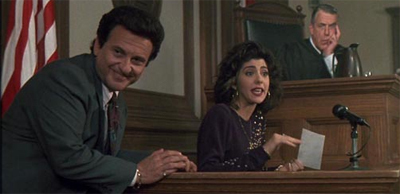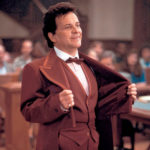My Cousin Vinny is the sort of film you would normally expect me to hate, quite apart from an aversion to the name Vinny. Like Legally Blonde, you would almost expect it to be launched on the Broadway stage as a musical, that kind of schmoozy feelgood vacuous popular appeal.
It is to tense John Grisham style courtroom thrillers what Analyze This is to Goodfellas; and talking of Goodfellas, you’ll remember Joe Pesci’s psychotic wisecracking gangster in that movie? Here he’s a wisecracking rookie lawyer who looks more like a junior mafioso, thankfully without any identifiable psychotic traits. Some of the courtroom scenes are reminiscent of Miracle on 34th Street, but for the absence of Kris Kringle as a defendant and rather more pertinent evidence about tyre tracks.
Actually, I have to admit my initial fear and loathing was not justified. My Cousin Vinny, despite appearances to the contrary, is likeable, funny, well-written, nicely performed, and, in the final analysis, members of the jury, demonstrable of excellent research on 63 Buicks and 64 Pontiacs, but more of that later.
MCV has a good number of factors in its favour. Writer Dale Launer has an excellent track record of well-constructed comedies with substance (Ruthless People, Blind Date, Dirty Rotten Scoundrels); director Jonathan Lynn is, of course, British, and with a track record including the likes of the much-loved Yes, Minister and Yes, Prime Minister; and there is a quality cast.
Apart from Pesci as the eponymous Vinny Gambini, I particularly love the late Fred Gwynne (aka Herman Munster) as impatient and suspicious Judge Chamberlain Haller, and Marisa Tomei, who won Best Supporting Actress for her role as Gambini’s girlfriend, sidekick and car expert Mona Lisa Vito.
Within the confines of a relatively simple plot, much of the loveable nature of this film relates to the character arc of Gambini and the carefully constructed get-out clause that allows our hero to win the day, courtesy of Mona Lisa’s glorious rant from the witness box, which probably won Tomei her Oscar on its own.
There are silly bits that stretch credibility, but so well is the scenario played you would be more forgiving than in similar movies written and directed without the freshness and vitality to be found in MCV, quite apart from worthy laughs.
In case you are not aware of my distinction here, worthy laughs are those deserving of laughter in their own right, with no hint of forced laughter-because-you’re-supposed-to-laugh, usually accompanied by hammy acting to tell you where to butt in. The last time I encountered such a moment was in a Come Dine With Me episode where a woman in a low-cut top asked a butcher what he thought of breasts; his deadpan face was a picture. It needs an actor of the calibre of Leslie Nielsen to do that on screen, though in MCV the laughs are more a case of that rare commodity, good timing.
Made in 1992, this is now a movie on the “much cherished” list for a good number of viewers. Not that you would regard it in awe, like its epic cousin Goodfellas but it seems to have stood the test of time better than most comedies of its era, and retains the power to charm and delight. For this small mercy we must be grateful.













